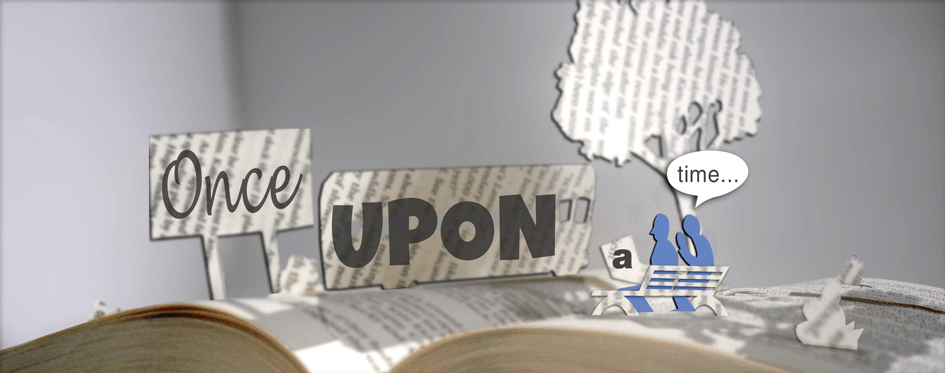Storytelling for events is not a new trend for now. We don’t need to get convinced it is a powerful tool for business, yet the one that has come from creative industry. Events encompass both creative and business elements and thus perhaps it is not a big surprise event designers tend to use stories in the events management process. However, despite the effectiveness of the method, there is still a long way to go in terms of improving the way we use it.

Image source: brandstories.net
Telling a story in my view is kind of ‘genious lies in simplicity’ thing. What can be more simple than telling a story? Also, it is so obvious that a story would be more interesting than a number of facts. However it took a while before the full awareness of how effective this tool is for business, has come. Yet, it is still not quite simple: you’ve got to have a good story but also, you have to be able to tell it well. Besides, I think we should always note that a story does not exist separate from a person telling it. The implication for this is that any professional using this tool right is bound to get advantage before others. Such skill will definitely raise their chances to succeed in whatever they do: looking for a new job or promotion, attracting investments to a startup, communicating with partners or clients, sales etc.
For events context, I believe storytelling has twofold function: strenthening emotional effect and contributing to making all loud and simple. But first things first.

Image source: drewsmarketingminute.com
Stortelling has been used in psychological practice and is defined as a way of communicating information.
Why is it so effective?
Stories is not only something that rootes deep in our childhood (but surely we all loved to make and listen to stories, didn’t we?) It turns out the reason for its large impact is in how our brains work. Which actually implicates that if we use the tool right, we are bound to get the certain results.
This great inforgraphics shows that listening to numbers and facts activates 2 regions of our brains, while listening to the stories activate 7 – this is almost 4 times more!
I am copying here an example of two pitches Emma Brudner gives in the article. It clearly demonstrates how storytelling works in practice:
“Our product was voted #1 in customer satisfaction. It is 33% better than service X. It saves time and money.”
“Steve at Business Corp. switched to our product from service X about six months ago, and he told me last week that it’s saved the company $5,000 and about 10 reporting hours per week. He actually got a promotion for spearheading the transition! And the best part is that his whole staff loves the product.”
Obviously, the second pitch is better remembered and triggers emotional response – exactly what is required.
Now, storytelling for events.
As powerful storytelling is for brands, as the story of an event make an impact on its attendes and all the stakeholders. Same principles apply, basically – an event with a story
- is more memorable
- triggers more emotional response and thus creates more buzz around
- inspires and motivates to take actions
- overall is more effective, not least because it contributes to the circle of event
a good story is a great tool to keep the event circle going; it works throughtout the whole cycle of event: it can be started long before an event, kept being told during an event and be something to build on after the event
Well, seems like creating and telling a story is one of those skills that soon would be on eventprofs’ CVs as a required one. Surely, it is not easy to tell an engaging story that motivates and grabs all attention. Unless you’ve got a natural talent, it is a skill to learn and practice. How? Where to start?
I recently came across a great tool – simple, effective and free – ESB Cаnvas
Why is it great?

Image source: storyboard.events
Stoyboard method has come from animation to visualise the course of the planned story. In this way, all invloved can clearly see all stages of the story, identify and correct elements, discuss turns and dynamics. Gradually, other industries adopted the method, and now we’ve got it as another trendy tool in the hands of an eventprofessional.
Visualising is undoubtedly the most advantageuos way when discussing or presenting ideas or strategies or the like for some audience (be that company’s board, investors, fellow co-workers, students, or – the event participants)
Founders of ESB Canvas are not the inventors of the method but among those first who applied it to the needs of event organisers. Combining principles of storytelling and storyborading they apply it to an event design process. Actually, Tim and Martijn say the canvas can be successfully used by anybody requiring to solve their task effectively, the task being from presentation to the department head to a startup pitch. But more importantly, it definintely can be successfully used by event professionals
Coming back to using the tool by the event designers, I would like to draw your attention to the following. It seems to be quite a simple tool and therefore not everybody and not always pays due attention to it. Thus we call for thinking twice and definitely recommend using ESB canvas (or similar techniques) first of all when creating an event concept/idea and also when discussing the event with your stakeholders.
Why?
Event Storyboard Canvas will help
- first of all, make it clear for yourself (!) what the goals of an event are, who your customers are, what results you’d like to achieve etc) and visualise the desired course of your event
- see gaps and other faults and get rid of them at this initial stage (priceless!)
- clearly demonstrate your event idea to outsiders and increase level of understanding from your audience by visualising the idea for them .
- create canvas for your event story which in turn be the basis
- for your interaction with participants and partners
- for working with emotional responses
- for the overall event experience – the one that makes your event stand out in the short and long term.
ME
Also read:
5 tips to design a storytelling event by Tim Corporaal, ESB Canvas founder.
Our earlier article on storytelling by attendees



